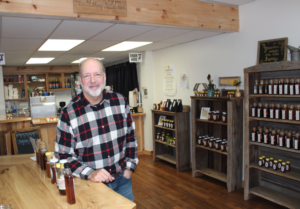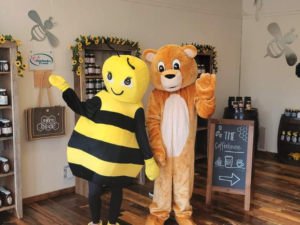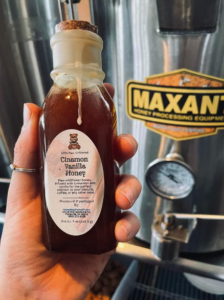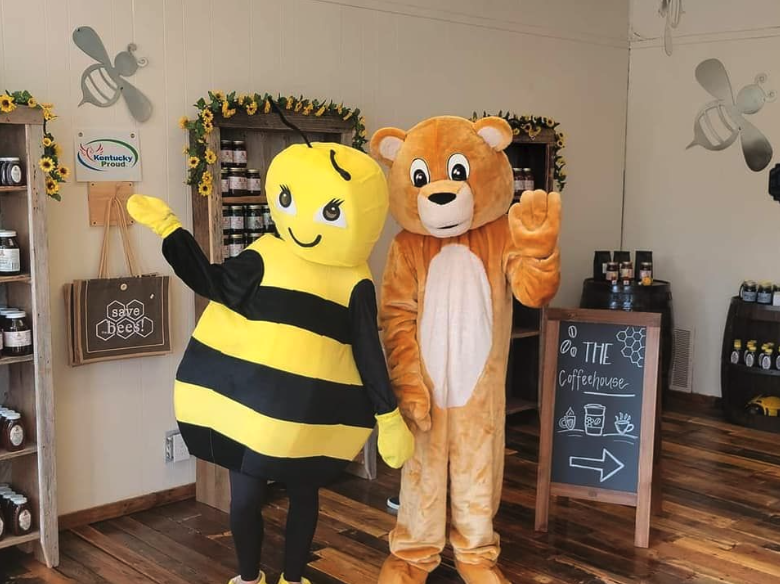Right on the Honey
HoneyBear Farms Founder Opens Two Honey Depot & Coffee House Locations
Writer / Christy Heitger-Ewing
Photography Provided
 Prior to 2013, Joel Gonia was working full time as a business consultant, meeting with accountants and attorneys regarding various business acquisitions. Following the recession, however, much of that work fell away, so Gonia began searching for something to fill the void. He stumbled upon beekeeping and enjoyed it, because he loves being outdoors and learning something new.
Prior to 2013, Joel Gonia was working full time as a business consultant, meeting with accountants and attorneys regarding various business acquisitions. Following the recession, however, much of that work fell away, so Gonia began searching for something to fill the void. He stumbled upon beekeeping and enjoyed it, because he loves being outdoors and learning something new.
I got stung a few times, but thats part of the deal, says Gonia, who started out with two hives and grew to 400 within three years. I thought I could do my part in helping to save bees because the pollination they provide is essential to our food chain.
Beekeeping, which was a hobby at first, quickly turned into a commercial venture after Gonia attended several beekeeping conferences. He chatted with speakers, who became resourceful mentors. With their assistance, Gonia began teaching seminars and hosting the Louisville Bee School, a popular activity that has drawn as many as 200 participants in years past.
In 2018 Gonia decided to open a beekeeping store called HoneyBear Farms (doing business as The Honey Depot), where he sold beekeeping equipment and honey to the Louisville market. According to Gonia, the fastest-growing segment of the population showing an interest in beekeeping is women, followed by teenagers.
For three years the business was going strong. For instance, schools used to take field trips to the farm to learn all about beekeeping. The Honey Depot was also one of the five approved excursions in the area for Airbnb. That meant that anyone who booked an Airbnb reservation when coming to Louisville would be asked, after making their reservation, if they would like to visit The Honey Depot. That exposure meant they did close to 100 tours in 2020. These tours were not indoor seminars. They were hands-on, interactive tours in which participants learned all about honeybees and safety.
We put on the [beekeeping] clothes and took [participants] outside, Gonia says. It was a three-hour tour and people loved it.
Unfortunately, in the fall of 2021, Gonia was notified that he would have to vacate his property due to a road-widening project. He searched for another location that would work but never did find something that fit the business model. They ended up relocating to their warehouse in Fisherville, Kentucky, two miles down the road, but it was a different market without any traffic exposure, and that was significant.
We had a stabilized business before, with a very high traffic count and a very low overhead environment because we were able to operate as a farm, Gonia says. Since operating commercially, it has been extremely challenging.
In the last year Gonia has been trying to think outside the box, figuring out next steps for his business to survive. In August he opened Honey Depot & Coffee House, located near downtown Mount Washington on Bardstown Road. It was a segue into a new concept for which they roast, grind and sell their own coffee, and also sell honey, honey-based products like beeswax candles, jams and jellies, soaps, bee-themed jewelry, and other bee-themed merchandise.
 Our coffee is sourced globally and roasted locally, Gonia says. We refer to Honey Depot & Coffee House as the artisan community coffee shop that sells honey.
Our coffee is sourced globally and roasted locally, Gonia says. We refer to Honey Depot & Coffee House as the artisan community coffee shop that sells honey.
In September of 2022, they opened a second location in downtown Jeffersontown on Watterson Trail, in Gaslight Square, and are currently in the process of incorporating a drive-through there. Their honey is also available around town at many stores, including the Fire Place and A Taste of Kentucky, and at neighborhood farmers markets throughout the spring and summer.
Eventually, Gonia hopes to open a total of five Honey Depot & Coffee House locations. First, he wants to get the two stores stabilized. He would also like to get reconnected with schools and other organizations, as they were before the move.
We have always been community-oriented based on our previous experience operating as a farm, Gonia says. Now as a commercial enterprise, it just takes longer to reconnect with those organizations.
Although they used to sell their own honey, they can no longer do that since they dont have as many hives. Therefore, they purchase honey from other beekeepers from around the state – but it still tastes great. They sell different flavors of honey. Their base honey is Kentucky wildflower because it is predominant in Kentucky and surrounding states.
We dont have any fields of flowers large enough to have a predominantly single source like clover so we cant have clover honey, Gonia says. They take the areas wildflower honey and infuse it with different flavors like bourbon honey. They also sell their bee venom flavor, which is a spicy honey, as well as cinnamon vanilla, lavender, elderberry and others.
In case you didnt know, there is a big difference in taste between locally produced honey and the kind you buy in grocery stores.
A lot of times in the big-box stores, you really dont know what youre buying, Gonia says, noting that stores purchase honey from all around the world. Its important to buy domestic honey. Its important to buy regional honey and local honey. Occasionally you can even buy neighborhood honey.
 Honey, which is made with pollen, nectar, water and soil from trees, is beneficial for health in two ways. Firstly, its a naturally occurring antiseptic, so if eaten on a regular basis, it cleanses you from the inside out. Gonia claims that rubbing honey on a cut will often quicken the healing faster than an ointment purchased at a drug store. Honey can also be good for allergies as it can strengthen the immune system.
Honey, which is made with pollen, nectar, water and soil from trees, is beneficial for health in two ways. Firstly, its a naturally occurring antiseptic, so if eaten on a regular basis, it cleanses you from the inside out. Gonia claims that rubbing honey on a cut will often quicken the healing faster than an ointment purchased at a drug store. Honey can also be good for allergies as it can strengthen the immune system.
As you eat more honey it will help you over a period of time, says Gonia, who notes that if you eat honey from beyond a couple of states away, its still good for you if its real honey that hasnt been pasteurized and filtered. However, from an allergy standpoint, you wont get much benefit in terms of immunities because youre ingesting pollen that is different from pollen within the Ohio Valley.
We know that honey has been beneficial for a long time, Gonia says. People have been harvesting it as far back as 3500 B.C. There are drawings on cave walls. Its been traded as currency.
Gonia is still doing his part to save the bees.
There have definitely been some gains and some pitfalls along the way, Gonia says. As a company we have evolved from hobbyist beekeepers to becoming a retail coffee shop selling honey.
Gonias favorite aspect of working in this field is interacting with the community and teaching them about bees. For instance, did you know that one out of three foods you buy at the grocery store requires pollination?
We love to sell coffee and honey, but really what were trying to do is educate people about the importance of honeybees, he says. Honeybees are the number one pollinator in the world, so if you remove them from the equation its difficult for us to survive on our food supply.
They hope to continue honeybee education for one simple reason.
Beekeeping is in our DNA, Gonia says.
Honey Depot & Coffee House is located in Mount Washington at 435 North Bardstown Road, and in Jeffersontown at 10512 Watterson Trail.






